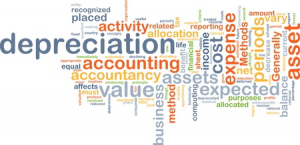
Everyone knows that one of the key ways to maximise investment returns is to be smart about your tax. Getting the most out of your deductions can be the difference between so-so returns and reaching the lifestyle you want. So why do so many people miss out on a fantastic source of deductions? It’s not interest on your mortgage and it’s not maintenance or repairs. In fact, it’s so intangible that you won’t see it unless you know it’s there. We’re talking about depreciation; the loss of value of your items.
A simple analogy that most people will be familiar with is the purchasing of a new car. Whatever the price you pay at a dealer, once it leaves the driveway you know its value has decreased. Suddenly, it’s a second-hand car and you can’t sell it for the same price you just paid for it. The same goes for a new house, fittings and fixtures. The difference is that if you’re using these items as a source of income, then you can claim this loss of value against your tax liability. So why do so many people miss out on this? The simple answer is they’re just not aware it exists.
Get the right advice.
To understand your entitlements, you need to draw up a tax depreciation schedule. This outlines what items are depreciating in value and at what rate, in line with the appropriate tax rules and regulations. If this all sounds like unfamiliar territory, then it’s recommended that you engage a registered Quantity Surveyor. As one of only a few professions recognised by the Australian Tax Office to have the appropriate skills to estimate construction and building costs for depreciation, you can be assured they’ll get the most accurate record of your entitlements. This one-off cost of as little as $400 can provide ongoing savings that far outweigh your initial outlay.
The depreciation schedule should include the following items;
- A detailed forty year forecast table illustrating all depreciable plant and equipment items together with the capital works deductions.
- The difference in claims using both the prime cost and diminishing value methods of depreciation.
- A comparative table of the two methods of depreciation.
In a similar vein, you should ensure that your accountant is familiar with property investment. The correct accountant can assist you to set-up tax effective financial structures, allowing you to reach your investment and lifestyle goals faster. An accountant with a real passion for property is a great sign that they’ll be able to get the most out of your investment.
Now is the time to act.
Don’t leave it another year and miss out on deductions that can help boost your portfolio. Set yourself up for next year’s tax time now, and get yourself a tax depreciation schedule. If you want any more information, then come and see us at Australian Property Panel. We believe that having the right team behind you makes all the difference in the world. That’s why we make it out job to not only provide you the information you need, but to link you with the right people to see that your investments work for you, bringing you closer to the lifestyle that you desire.
If you’ve got more questions, then please visit our FAQ’s page or contact us here.
Posted by Peter Spencer on 21 February, 2017 2:05 pm

